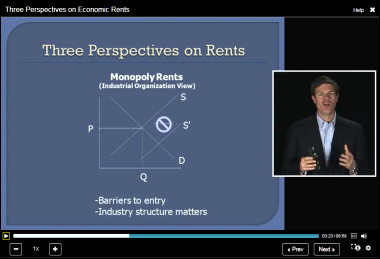The title of my previous post, Let’s get rid of the instructional designers!, was a tongue-in-cheek reference to a radical view of instructional design.
I think it would be safe to say that the vast majority of us in the L&D profession do not advocate the riddance of instructional designers. On the contrary, they are the experts in a science that is critical to the overall performance of the organisation.
The title of this post however, while similarly tongue-in-cheek on my part, is much less so on the part of many of my peers.
We live in an era where “training”, “lecture”, “course” and even “teaching” have become dirty words. In their place, a learner-centered vocabulary espousing “inquiry”, “exploration” and “discovery” are the soupe du jour.
A manifestation of this trend is no more vivid than in the invective directed at MOOCs – or more accurately, xMOOCs. To many L&D folks, these types of courses (there’s that word again) are mere replicas of the lectures and exams that they so despise. Ergo, xMOOCs are bad.
Now I maintain this view sells xMOOCs short, but for the sake of argument I’m willing to pretend that this mode of delivery is devoid of constructivist empowerment. I acknowledge that many MOOCs do replicate olde worlde instructivism, at least in part.
And here’s where I propose something counter-radical: Sometimes that’s a good thing.
Indeed, I advocate direct instruction under the following circumstances:
1. When the learner is a novice.
Novice learners don’t know what they need to know. But the expert does.
By adopting an instructivist approach, the expert can scaffold the learning experience and construct a foundational framework for the subject matter. The learner can then build upon this foundation by other means.
2. When the subject matter is complex.
By definition, complex subject matter consists of interconnected parts which may be difficult to make sense of through inquiry, exploration and discovery.
Sometimes it makes more sense to have someone who understands the system explain it to you end-to-end.
3. When the subject matter is black & white.
It’s worth noting that complex is not the same as complicated, whereby inquiry, exploration and discovery may be eminently suitable for gathering multiple versions of the “truth”.
Geopolitics springs to mind, but cooler headed topics such as strategic thinking and decision-making are also highly dependent on context, lending themselves to a more constructivist approach.
But not all topics are like that. Consider financial statement analysis: the content is so straight-forward that it would make little sense to inquire, explore and discover, when you could simply see how it’s done and practise it for yourself.
4. When speed to competence is important.
Learners in the workplace are time poor, and whatever the topic, their employer demands that they get up to speed quickly. Otherwise, don’t come Monday.
These people don’t have the luxury of a semester to inquire, explore and discover. They need to know what they need to know now.
5. When the learning outcome is non-negotiable.
There are some things that your employer must know that you know. It may be critical to your role, a compliance obligation, or a risk management issue; so it can’t be left to chance.
Personally, I think the indicator of must-know learning is its assessment. I wouldn’t care so much where, when or even how you learned it, so long as you did.
However, I can also see that if an employer found itself in court because one of its employees sexually harassed one of his colleagues, it would want to demonstrate that it had provided sufficient training to that individual.
6. When the learner is less inclined.
We in the L&D industry tend to believe (or want to believe) that our target audience is just like us. They’re self-motivated individuals with a hunger to inquire, explore and discover.
The truth, of course, is that our target audience occupies the full spectrum of autodidactism. And dare I suggest many huddle at the lower end.

Getting back to xMOOCs specifically, another point I wish to make is that just because they are delivered in an instructivist manner, does not mean they must be consumed in an instructivist manner.
While the learner is free to work their way through the curriculum along the pre-defined weekly path, they are also free to inquire, explore and discover at their discretion within a thoughtfully structured environment.
But oh no! If we empower the learner to drive their own MOOC experience, they might not finish it!
As history reminds us time and time again, no one view is ever the “right” one – at least, not all the time.
Our perspective is so dependent on the circumstances that we learning pro’s must appreciate the problem before trumpeting or poopooing the solution.
Just as it makes little sense to get rid of the instructional designers, it makes little sense to get rid of the instructors. Instead, let’s get smarter about instruction.


While I agree with a lot of what you are saying, and given my general non-belief in the value of MOOC’s in a corporate environment, that is something. Number 3 concerns me, I think complicated subjects are maybe better handled in a more directed environment, where the areas of enquiry or the general direction lead by the instructor. I think this becomes far more important when we begin to discuss competence and non-negotiable outcomes. I think there is a balancing act that needs to be performed here between direct instruction and a more open style of learning and to be honest I think that balance is sometimes very hard to find. But all of this might just be my Luddite tendencies showing themselves.
Thanks for your comment, Paul.
Indeed I think most of us would agree that the balance between direct instruction and a more open style of learning *is* hard to find, Luddite or otherwise.
And according to David Hopkins being a Luddite is a compliment!
Great to see you write on MOOCs Ryan. Although I can see the advocating of this medium is still firm in L&D land, I am still not convinced. You are though correct on one thing – time will tell on MOCs, but for me the MOOCs platform and processes have existed for the last number of years – all we have done is simply added a new “badge” to them so they become the new “FAD” for learning.
The Revolution has begun comrade – we need to resist all these FADS and GIMMICKS!
Thank you for sharing your view, Con.
Not everyone is a self learner, but this doesnt mean we cant start growing a culture of lifelong & independent learning within our organizations. This is why companies need to invest in robust content management systems #cms or #lcms to facilitate self learning & promote easier access to content/info/discussion needed for employees to complete their jobs.
Yes it’s true that there will always be subjects that require some regulation or where learning must be tracked for compliance, but we all have been at some point held hostage by inability to access info or training needed to do our work.
Thank you for posting.
Thanks for your comment, Natalie.
I 100% agree. While not everyone is a self learner, the organisation is doing itself a disservice if it doesn’t support those who are.
To me, a CMS such as the one you describe is low hanging fruit that should be central to the organisation’s learning strategy.
Provoking post as always Ryan. Even though direct instruction does seem to come under fire a lot (apparently we are all self-directed, all the time) it’s refreshing to read, as you’ve pointed out, that there are indeed times when it’s necessary and is a perfectly good choice.
I’m certianly not giving up on MOOCs just yet because I believe they have potential – we just haven’t quite found it yet. If used in a corporate environment, I think we need to do more help to create conditions that support people who are completing them.
Thanks for your comment, Matt.
Indeed, I don’t see the role of the learning pro as being the instructor (that’s a job for the trainer, preferably the SME), but rather the *supporter* of the learning journey. Of course, that applies to MOOCs too.
In the MOOC environment, the instruction comes from the professor and arguably also from the network of fellow learners. So our role, as you say, is to support our people who are participating.
Ryan – This is an awesome post – very Jonathan Swift of you :D Our ID firm just started using the LMS at http://www.LearnerNation.com a lot more exactly because they are VERY much in line with your point that instructional designers are crucial but their LMS allows some user generated content inflection points to engage the learners. They get it what you’re pitching here = ) EK
Oh I do love a literary reference. Well played, EK.
I am a big fan of UGC. In fact, I think most (if not all) content should be generated by the SME in the business, with the IDs doing what they do best: ID.
Cheers for the comment :0)
Nice one, Watching is good but there would be a problem that they cannot entertain our Questions at that time or we have to send them some emails any thing we have query about….
So i think that there should be possible solution for this problem.
Thanks!
In the case of a MOOC, Laura?
If so, yes, unlike in a face-to-face class, the participants don’t have that immediacy with the instructor. (Some may argue they don’t have that in class either, but let’s leave that aside for now.)
So MOOCs are quite dependent on the connections made among the participants in the social space – whether that be the MOOC’s own discussion forum or the offshoot Facebook group etc.
I advocate for MOOC instructors to be active in the social space, but alas that doesn’t always happen.